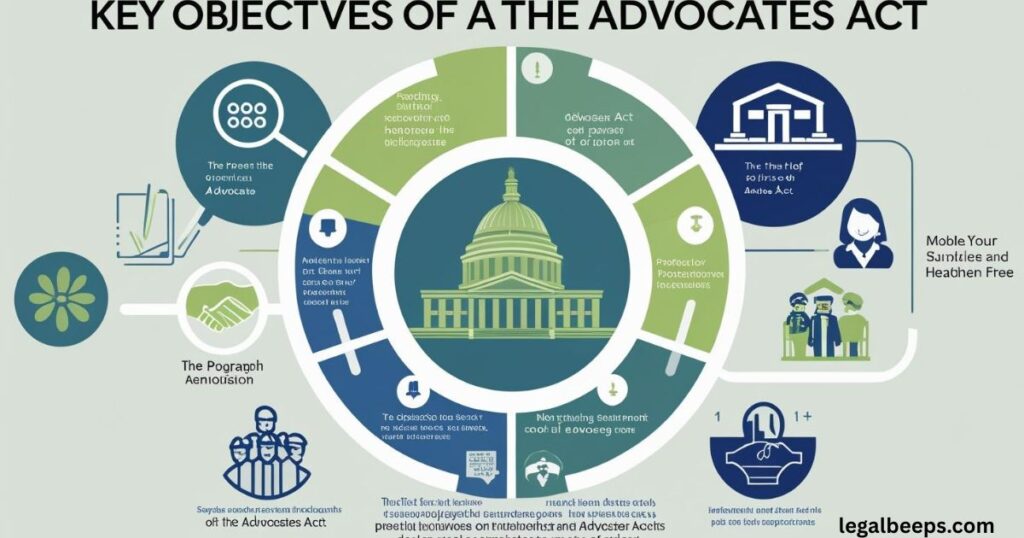Understanding the Advocates Act 1961 is key to grasping how the legal profession operates in India. This groundbreaking law, which came into force on 19th May 1961, revolutionized the way advocates are governed and regulated. While Exploring the Advocates Act, you’ll uncover the salient features of the Advocates Act 1961, including the creation of Bar Councils and clear enrolment procedures.
For law students and professionals, Advocates Act 1961 notes are a goldmine of information, offering detailed insights into the qualifications needed to practice law. These notes also explain the disciplinary processes and the vital role of the Bar Councils. Whether you’re searching for Advocate Act 1961 notes or simply Exploring the Advocates Act, this law lays down the foundation for ethical legal practices and sets clear standards for the profession across India.
Brief History of Advocates Act

Before the Advocates Acct of 1961, India’s legal profession was governed by various laws like the Legal Practitioners Act, 1879, leading to a fragmented system. Legal practitioners were categorized into pleaders, vakils, mukhtars, and advocates, each with different rules depending on the court.
Before the Advocates Acct, legal practice in India was fragmented, leading to confusion and inconsistency.There was no uniform standard for qualifications, resulting in inequality among practitioners across different regions.Major legal reforms were required to establish consistency, fairness, and uniform professional standards nationwide.
In response, the Advocates Acct was passed in 1961, following the recommendations of the All India Bar Committee. The Act aimed to create a unified class of legal practitioners,advocates and establish Bar Councils to regulate the profession and maintain standards.
Objectives of Advocates Act

The Advocates Acct, 1961, was designed to address several key objectives that aimed to streamline the legal profession in India. Over the years, this act has undergone amendments, with the latest being the Advocates Acct Amendment Bill 2023. While there are several objectives outlined in the Act, some of the most significant ones are highlighted below.
Standardization of Legal Profession: The primary goal of the Advocates Acct was to establish a single class of legal practitioners, known as advocates, thus differentiating them from other categories of lawyers and creating uniformity in legal practice.
Qualification and Enrolment: The Act set specific qualifications required to become an advocate and regulated the process of enrolment, ensuring that only qualified individuals could practice law in India.
Disciplinary Control: Another important objective was to establish a system for maintaining professional ethics. The Act empowers Bar Councils to enforce disciplinary control, helping to prevent misconduct among advocates and ensuring high professional standards.
Bar Council Establishment: Finally, the Act led to the creation of Bar Councils at both state and national levels, which are tasked with regulating and overseeing the profession, as well as ensuring that advocates adhere to ethical and legal standards.
Key Provisions of the Advocates Act, 1961 and Their Impact
The Advocates Act, 1961 introduced several key provisions that significantly impacted the legal profession in India. One of the most notable is the establishment of the Bar Council of India and State Bar Councils, which regulate and oversee the practice of law. These bodies ensure that only qualified and ethical individuals can represent clients in court, maintaining the integrity of the legal system.
Another key provision of the Act is the standardization of qualifications for advocates. The Act sets out clear criteria for admission to the legal profession, ensuring that all advocates meet a minimum educational standard and undergo a rigorous process of enrolment with their respective Bar Councils. This uniformity ensures that lawyers across the country possess the necessary legal expertise.
Furthermore, the Act addresses disciplinary actions for advocates who violate ethical standards or engage in professional misconduct. By outlining specific procedures for dealing with grievances, the Act helps maintain the dignity of the legal profession and protects the rights of clients, promoting trust in the justice system.
Provisions of Advocates Act
Exploring the Advocates Act: The Advocates Acct, 1961 is a landmark legislation that governs the legal profession in India. It lays down comprehensive rules and regulations that guide the conduct and practice of advocates across the country. One of the key highlights while exploring the Advocates Acct is the establishment of the Bar Council of India and various State Bar Councils.
These bodies are entrusted with the responsibility to regulate, supervise, and maintain professional standards within the legal field.The Bar Council of India and State Bar Councils play a crucial role in ensuring that advocates adhere to ethical and legal guidelines. Additionally, the Advocates Acct defines the essential qualifications required to become an advocate, setting clear guidelines for the enrolment procedure with the respective State Bar Councils across India.
Another significant aspect while exploring the Advocates Acct is the exclusive right to practice law granted solely to enrolled advocates. This ensures that only duly qualified individuals represent clients in courts, fostering a standardized and ethical system of legal practice. The Act also outlines strict provisions for disciplinary actions, empowering the Bar Councils to act against advocates involved in professional misconduct or breaches of ethical conduct.
Chapter-I
Chapter I of the Advocates Acct, 1961, is titled Preliminary and includes Section 1 and Section 2. Section 1 lays out the short title, extent, and commencement of the Act. It makes it clear that the Act applies across the whole of India. It also allows the central government to bring different provisions into effect at different times and in different regions as needed, offering flexibility in implementation.
Section 2 of this chapter defines key terms such as “advocate,” “legal practitioner,” and “High Court.” These legal definitions are essential for the correct understanding and interpretation of the Act. They serve as the basis for how the entire legal profession is regulated, ensuring consistency in practice, enrollment, and disciplinary actions.
Overall, this chapter lays the foundation for the entire Advocates Acct, 1961, establishing clear terms and scope. It ensures a common understanding, which promotes uniformity and smooth functioning of the legal system, helping maintain consistency across India in the regulation of the legal profession, benefiting both lawyers and clients.
Chapter-II
Chapter II of the Advocates Acct, 1961 focuses on the establishment of the Bar Council of India and State Bar Councils, detailing their structure, purpose, and powers. These councils are crucial for overseeing the legal profession in India, ensuring that advocates comply with regulations and maintain high standards of conduct and discipline.
The chapter also outlines the process for electing members to these councils. It specifies the roles and responsibilities of both the Bar Council of India and the State Bar Councils, which are tasked with maintaining ethical standards in the legal profession. Their primary responsibility is to ensure that advocates practice law professionally and ethically.
Furthermore, this chapter grants the Bar Councils the authority to create rules governing legal practice, including procedures for enrolment, conduct, and disciplinary actions. By doing so, Chapter II helps establish a robust system that regulates and upholds the integrity of the legal profession in India, ensuring that lawyers remain accountable and the profession is fair and well-regulated.
Chapter-III
Chapter III of the Advocates Acct, 1961 sets out the qualifications necessary to become an advocate in India. It details the process through which individuals can register with a State Bar Council after meeting the required legal education standards. This ensures that only qualified and competent candidates can enter the legal profession, maintaining high standards for legal practice.
The chapter also specifies conditions under which an individual may be disqualified from practicing law. For instance, anyone convicted of certain criminal offenses is not eligible to practice as an advocate. This provision ensures that only those with a clean record can represent clients, maintaining ethical standards and public confidence in the legal system.
Additionally, Chapter III establishes the educational qualifications required for becoming an advocate, mandating a law degree from a recognized university. This requirement ensures that all advocates possess the necessary legal knowledge and training to practice law effectively. By setting these clear standards, the Act fosters professionalism and upholds the integrity of the legal profession in India.
Also Read: Anticipatory Bail and Section 438 CrPC: Your Legal Shield Before Arrest
Chapter-IV
Chapter IV of the Advocates Acct, 1961 defines the right to practice law for advocates enrolled under the Act. It grants them the exclusive right to appear and represent clients in any court, tribunal, or authority across India. However, advocates must meet additional qualifications to practice in the Supreme Court.
This chapter emphasizes that only those advocates who are enrolled under the Act have the authority to represent others in legal matters. This ensures that the legal profession remains uniform and regulated, with only certified and qualified professionals handling court proceedings. By limiting representation to enrolled advocates, the Act ensures that legal practices are carried out by individuals who meet professional standards.
Moreover, the provision grants enrolled advocates the exclusive authority to plead on behalf of clients, safeguarding the quality and ethical standards of legal representation. This provision is crucial for maintaining fairness in the judicial process and strengthening public trust in the legal system, ensuring that only competent and responsible professionals represent clients.
Chapter-V
Chapter V of the Advocates Acct, 1961 is dedicated to ensuring the conduct and discipline of advocates. It grants State Bar Councils the authority to take action against advocates found guilty of professional misconduct or violating ethical standards. This provision is crucial in preserving the integrity and trust in the legal profession.The chapter establishes a clear procedure for handling misconduct cases.
It requires the formation of disciplinary committees, which investigate complaints against advocates. Additionally, it provides advocates with the right to appeal decisions to the Bar Council of India, ensuring that disciplinary actions are carried out in a fair and transparent manner, following due process and justice.
Moreover, the chapter offers a structured system for addressing complaints against advocates. By setting out clear guidelines, it helps protect the dignity of the profession while ensuring accountability. This not only helps uphold the public confidence in the legal profession but also plays a vital role in regulating legal ethics and maintaining high professional standards across India.
Chapter-VI
Chapter VI of the Advocates Acct, 1961 contains various miscellaneous provisions that play a crucial role in the smooth implementation of the Act. It empowers legal authorities to create rules to regulate the profession and acknowledges foreign legal qualifications, thus aligning Indian legal standards with global practices. The chapter also ensures protection for actions taken in good faith by individuals under the Act, providing legal safeguards for those working within the system.
Moreover, this chapter addresses transitional arrangements, allowing for a smooth transition from old legal frameworks to the new system. It also resolves various administrative challenges that might arise during the implementation phase. By doing so, it ensures that the legal profession can adjust seamlessly during the early stages without causing significant disruptions.
In essence, Chapter VI enhances the flexibility and adaptability of the Advocates Acct. By managing the behind-the-scenes operations and offering solutions to emerging challenges, it guarantees that the Act remains effective, efficient, and consistent across India, fostering a well-regulated legal system.
Chapter-VII
Chapter VII of the Advocates Acct, 1961 was introduced later and highlights the rule-making authority of the Bar Council of India and State Bar Councils. It grants these councils the power to create rules that help implement the Act effectively, ensuring proper regulation and governance of the legal profession, thereby maintaining discipline and high standards within the legal community across India.
This chapter grants the councils the authority to establish rules on crucial areas such as professional conduct, enrolment procedures, and disciplinary actions. These rules help maintain an organized, ethical, and standardized legal system across India, ensuring that advocates adhere to a strict code of conduct while practicing law.
Additionally, Chapter VII provides flexibility for the councils to update or modify the rules as required. This adaptability allows the Bar Councils to stay aligned with evolving legal practices and needs. By promoting continuous improvement, the chapter ensures that the profession remains relevant, ethical, and accountable, responding to challenges and maintaining high standards over time.
FAQ’s
When did the Advocates Act, 1961 come into force?
The Advocates Acct, 1961 came into force on 19th May 1961, bringing significant changes to the rules of legal practice across India, as highlighted in Exploring the Advocates Acct.
Why is Exploring the Advocates Acct important?
Exploring the Advocates Acct is important because it explains how advocates are trained, enrolled, and disciplined. It helps us understand the legal profession’s structure.
Who regulates lawyers in India under this Act?
Under the Advocates Acct, the Bar Council of India and State Bar Councils regulate lawyers in India, ensuring discipline, ethical standards, and fair legal practice across the nation, as outlined in Exploring the Advocates acct.
What do Advocates Act 1961 notes include?
While Exploring the Advocates Acct, we see that Advocates Acct 1961 notes include definitions, rights, qualifications, and roles of Bar Councils for easy understanding.
How is enrolment handled under this Act?
Exploring the Advocates Act shows us that enrolment is handled by State Bar Councils based on set qualifications, after which a person becomes a registered advocate.
Conclusion
The Advocates Act, 1961 is crucial for understanding the organization of the legal profession in India. It came into force on 19th May 1961 and significantly changed how lawyers are enrolled and regulated. The Act introduced the establishment of Bar Councils and set out rules for professional conduct. Some of the key features of the Act include standardization, enrolment procedures, and disciplinary control over lawyers.
Exploring the Advocates Act helps us better understand the rights and duties of advocates, as well as the qualifications and ethical standards required for practice. These notes on the Advocates Acct, 1961 are valuable for both students and legal professionals. If you’re looking for information on the Advocates Acct, 1961 or wondering when it came into force, this law is central to the legal system. In essence, exploring this Act offers a comprehensive overview of how legal practice is structured in India.

